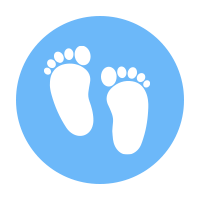- Children between 1 and 2 years of age need 11 to 14 hours of sleep a day (including naps). Consistent sleep times make it easier!
- Have steady routines for sleeping and feeding. Create a calm, quiet bedtime for your child. Put on his pajamas, brush his teeth, and read 1 or 2 books to him.
- Show your child different things, such as a hat. Ask him, “What do you do with a hat? You put it on your head.” Put it on your head and then give it to him to see if he copies you. Do this with other objects, such as a book or a cup.
- Sing songs with gestures, such as “Wheels on the Bus.” See if your child tries to do some of the actions.
- Expect tantrums. They are normal at this age and are more likely if your child is tired or hungry. Tantrums should become shorter and happen less as he gets older. You can try a distraction, but it is ok to let him have the tantrum without doing anything. Give him some time to calm down and move on.
- Teach your child “wanted behaviors.” Show her what to do and use positive words or give her hugs and kisses when she does it. For example, if she pulls your pet’s tail, teach her how to pet gently. Give her a hug when she does it.
- Limit screen time (TV, tablets, phones, etc.) to video calling with loved ones. Screen time is not recommended for children younger than 2 years of age. Children learn by talking, playing, and interacting with others..
- Is there anything your toddler does or does not do that concerns you?
- Has your toddler lost any skills he/she once had?
- Does your toddler have any special healthcare needs or was he/she born prematurely?
If your toddler is not meeting one or more milestones, has lost skills he or she once had, or you have other concerns, act early. Talk with your toddler’s doctor, share your concerns, and ask about a developmental screening.
If you or the doctor are still concerned:
- Ask for a referral to a specialist who can evaluate your toddler more.
- If the evaluation still shows concerns call your state Early Intervention program to find out if your toddler can get services to help. Learn more and find the number at Missouri First Steps Program.
What's Next?
Download the Milestone Tracker app today!
Track your child’s milestones from age 2 months to 5 years with the CDC’s easy-to-use illustrated checklists; get tips from the CDC for encouraging your child’s development; and find out what to do if you are ever concerned about how your child is developing. Photos and videos in this app illustrate each milestone and make tracking them for your child easy and fun.













